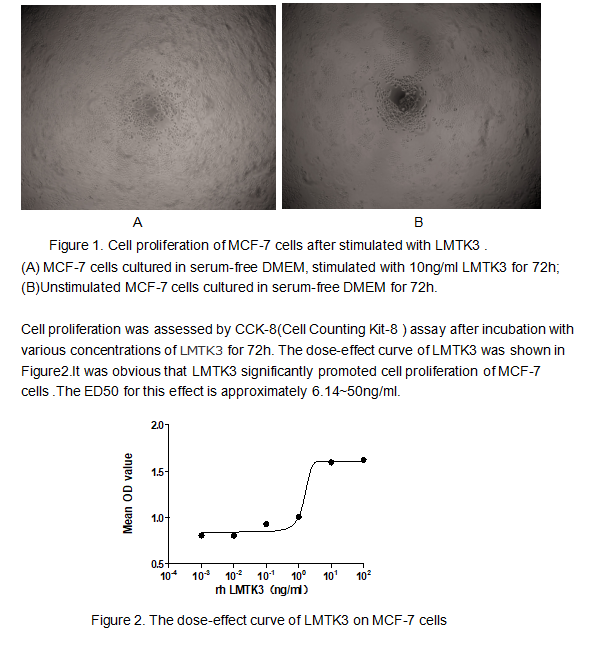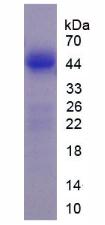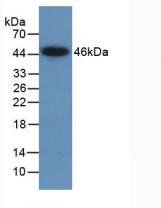Active Lemur Tyrosine Kinase 3 (LMTK3) 

LMR3; TYKLM3; Serine/threonine-protein kinase LMTK3
- UOM
- FOB US$ 270.00 US$ 675.00 US$ 1,350.00 US$ 4,050.00 US$ 10,125.00
- Quantity
Overview
Properties
- Product No.APE375Hu01
- Organism SpeciesHomo sapiens (Human) Same name, Different species.
- ApplicationsCell culture; Activity Assays.
Research use only - DownloadInstruction Manual
- CategoryEnzyme & Kinase
- Buffer Formulation20mM Tris, 150mM NaCl, pH8.0, containing 1mM EDTA, 1mM DTT, 0.01% SKL, 5% Trehalose and Proclin300.
- Traits Freeze-dried powder, Purity > 95%
- Isoelectric Point6.3
Sign into your account
Share a new citation as an author
Upload your experimental result
Review

Contact us
Please fill in the blank.
Activity test

Mechanism: Lemur tyrosine kinase 3 (LMTK3), a member of the receptor tyrosine kinase (RTK) family, is implicated in breast cancer growth and endocrine resistance.It has been reported that LMTK3 promotes cell invasion, motility, and migration of the MCF-7 breast cancer cell line . To test the bioactivity of LMTK3 ,MCF-7 cells were seeded into triplicate wells of 96-well plates at a density of 2,000 cells/well in serum-free standard DMEM after adding to various concentrations of LMTK3 protein. After incubated for 72h, cells were observed by inverted microscope and cell proliferation was measured by Cell Counting Kit-8(CCK-8). Briefly,10 µl of CCK-8 solution was added to each well of the plate,then measure the absorbance at 450 nm using a microplate reader after incubating the plate for 1-4 hours at 37 °C .
Cell proliferation of MCF-7 cells after incubation with LMTK3 for 72h observed by inverted microscope was shown in Figure 1.Cell proliferation of MCF-7 cells after incubation with LMTK3 for 72h observed by inverted microscope was shown in Figure 1.

Usage
Reconstitute in 20mM Tris, 150mM NaCl (pH8.0) to a concentration of 0.1-1.0 mg/mL. Do not vortex.
Storage
Avoid repeated freeze/thaw cycles. Store at 2-8°C for one month. Aliquot and store at -80°C for 12 months.
Stability
The thermal stability is described by the loss rate. The loss rate was determined by accelerated thermal degradation test, that is, incubate the protein at 37°C for 48h, and no obvious degradation and precipitation were observed. The loss rate is less than 5% within the expiration date under appropriate storage condition.
Increment services
-
 BCA Protein Quantification Kit
BCA Protein Quantification Kit
-
 Molecular Mass Marker for Protein
Molecular Mass Marker for Protein
-
 Monoclonal Antibody Customized Service
Monoclonal Antibody Customized Service
-
 Polyclonal Antibody Customized Service
Polyclonal Antibody Customized Service
-
 Protein Activity Test Experiment Service
Protein Activity Test Experiment Service
-
 Electrophoretic Mobility Shift Assay (EMSA) Experiment Service
Electrophoretic Mobility Shift Assay (EMSA) Experiment Service
-
 Buffer
Buffer
-
 Lentivirus Packaging Experiment Service
Lentivirus Packaging Experiment Service
-
 Adenovirus Packaging Experiment Service
Adenovirus Packaging Experiment Service
-
 Real Time PCR Experimental Service
Real Time PCR Experimental Service
-
 Spike RBD Protein (S-RBD)
Spike RBD Protein (S-RBD)
-
 Protein G
Protein G
-
 Protein A
Protein A
Citations
- Serum lemur tyrosine kinase 3 expression in colorectal cancer patients predicts cancer progression and prognosisPubmed:24174317
- Serum lemur tyrosine kinase-3: a novel biomarker for screening primary non-small cell lung cancer and predicting cancer progressionPubmed:4348877
- Uighur medicine abnormal savda munzip (ASMq) suppresses expression of collagen and TGF-β1 with concomitant induce Smad7 in human hypertrophic scar …PubMed: 26309506








